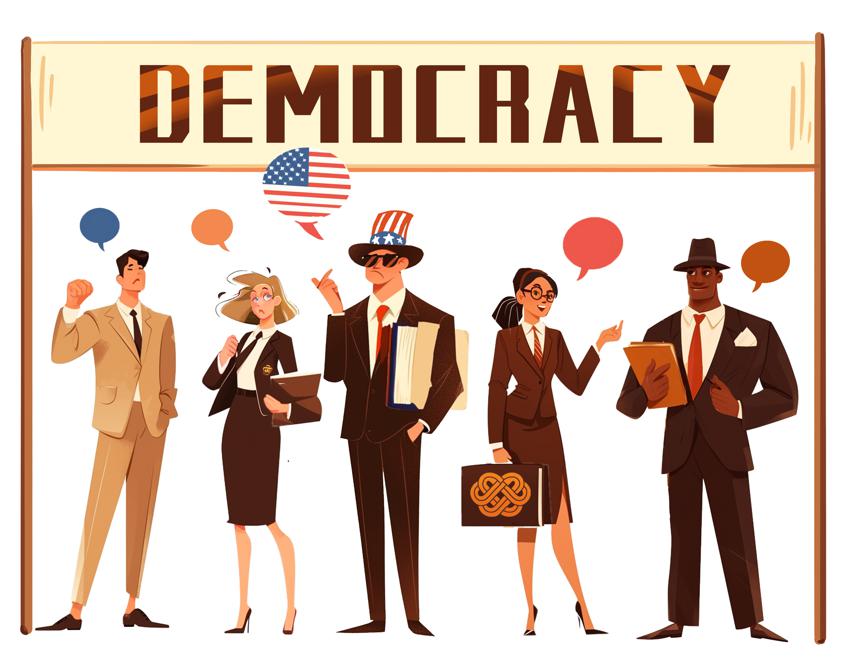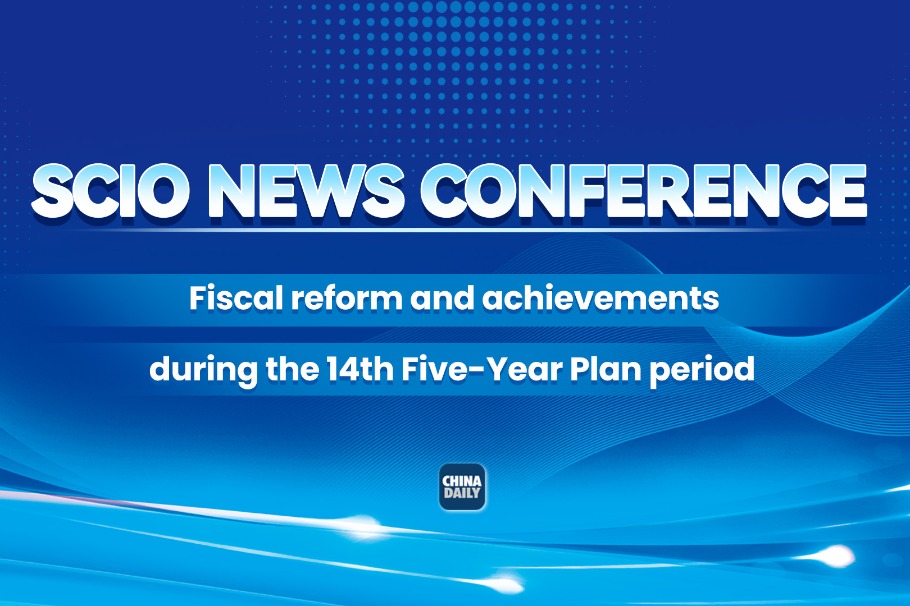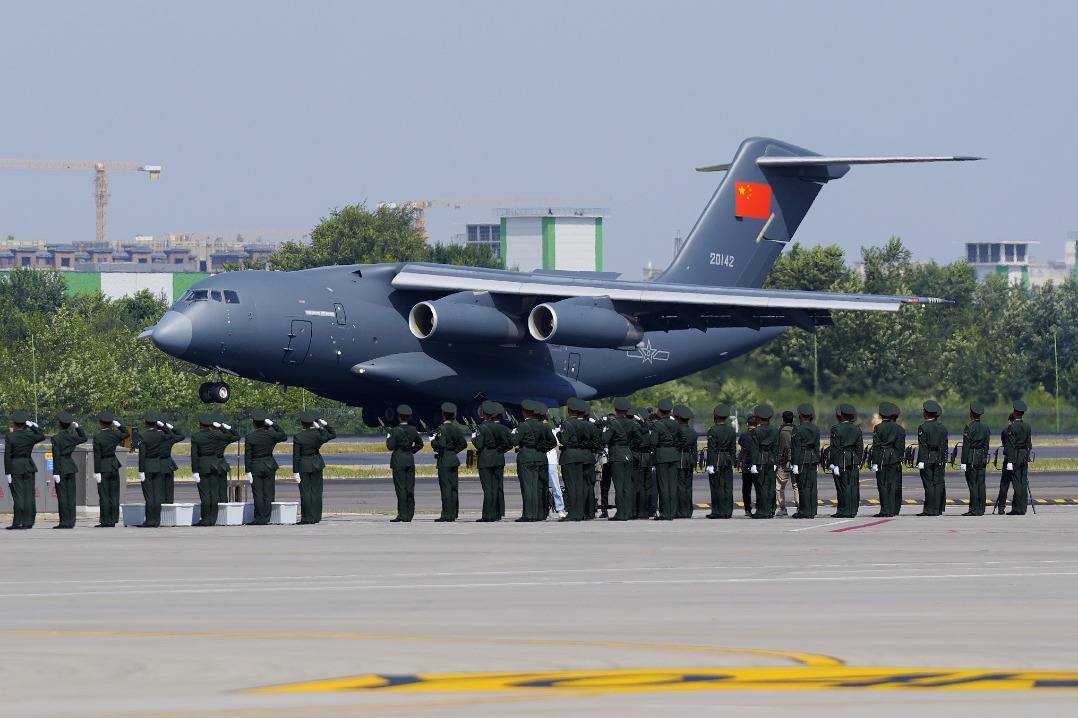West doesn't have monopoly over democracy


Editor's note: The third International Forum on Democracy: The Shared Human Values was organized by the Publicity Department of the Communist Party of China Central Committee and the State Council Information Office in Beijing on Wednesday. More than 200 experts from different countries, regions and international organizations participated in the conference. Excerpts from the opinions of three of the experts follow:
Democracy not a value of the West alone
Many in the West think that democracy is a value of the West; it's a flag that we can wave as opposed to other parts of the world. Some would like to see the narrative, "democracy" versus "autocracy", become the new Berlin Wall of a new Cold War, of a new bipolarity and of a new confrontationist position that will make all international cooperation difficult.
We Western people are proud of the democracy we have won and established in our countries, particularly in Europe. It is the fruit of a long historical process that began with the French Revolution, and whose main protagonist was the workers' movement, which was aimed at winning effective, popular sovereignty against the politically narrow oligarchies that had long dominated Western societies.
But this legitimate pride should not prevent us from seeing that our model of democracy, because it is the result of a long, peculiar historical process, cannot be exported to and imposed on other parts of the world, as the failed experiences in Afghanistan and Iraq and other Middle East countries have again shown in recent years.
It is also evident that today's world cannot be reduced to a binary contest between two democracy models. Those who believe, as I do, in the values of democracy should also realize that the logic of the Cold War and ideological challenge are not conducive to the circulation of ideas in which different civilizations and cultures can influence one another. On the contrary, acting on this logic, we could give rise to rigidity, which again is not conducive to the affirmation of human rights and democratic principles.
The ways to achieve sovereignty may be different, but the honor is on those who pursue an alternative model to the West to show in practice the compatibility between the absence of political pluralism and the effective exercise of freedom of expression and dissent, and the control on political power.
It's time for different civilizations and cultures to openly come together on the significant issue of human freedom and find ways to safeguard it, rather than merely engaging in ideological or propaganda confrontations.
While every country's political system is autonomously determined, there must be a transition toward a multipolar order in an interconnected world. This is the real global dimension of democracy, not to return to bipolarity, not to accept a unipolar world, but a world to govern together, a multipolar reality.
Massimo D'Alema, former prime minister of Italy
A more global transparent governance system needed
The fall of the Berlin Wall in 1989 not only started the end of the Cold War, but also the decade following the historic event perhaps marked the high tide of global democracy. At that time, there were high expectations that liberal democracy would spread across the world.
Three decades on, we realize that those expectations never really materialized. Instead, people are now lamenting the fact that democracy appears to be in regression. Issues that are relevant include poor governance undermining trust and credibility in many democratic institutions around the world, and economic inequality creating fertile ground for populist, ultra-nationalist and extremist leaders. With the advancement of technology, the new challenges that democracy faces now include the fact that artificial intelligence and big data can be used as tools by those engaged in divisive information campaigns and polarizing societies.
But my focus is on a different aspect. Over the past three decades, we have also been unable to reform international organizations that make up the global governance system. Indeed, our inability to do so contributed to the failure of the global governance system to keep pace with economic globalization. This means we don't have an effective or democratic global governance system.
Some of the above deficiencies require urgent fixing. The first is the global governance structure. Many international organizations were designed at the end of World War II, that is, almost three quarters of a century ago. The world has moved on considerably since then, and there has been a shift in the economic and political powers among the countries.
There are many emerging countries and economies which are now very influential and more relevant to global affairs, yet they continue to be underrepresented in international organizations, and they include countries in Asia, Africa and Latin America. It is time to correct this imbalance because it is democratic and the right thing to do.
Also, time and again we have seen the dominant powers enjoy the privilege of picking and choosing which rules or which agreements they comply with, sometimes even using veto powers to shoot them down if there is a conflict of interest. One cannot have a global governance system that can be called democratic if there is no equality under the same rules and same laws. This, too, needs to be fixed.
Besides, the decision-making process of many international organizations lacks in openness, transparency and inclusivity. It's time to improve the process and ensure widespread consultations on every important issue with more diverse stakeholders, maybe even civil society, taking part, in order to make the process inclusive. A more transparent and open process will also allow scrutiny from the global media.
More important, the decisions that are taken by international organizations often have a profound impact on many people around the world, and yet there is no system of accountability. It is time we built a system that would hold these organizations accountable, beginning perhaps with the creation of an ombudsman's office.
I believe this process itself will help build the foundation for a comprehensive global governance system that would ensure international organizations play a constructive role in spreading true democratic values in countries around the world.
Abhisit Vejjajiva, former prime minister of Thailand
Deficit of trust in Western democracies increasing
More than 2,500 years ago, Confucius and the ancient Greek philosophers deliberated on the same concept of moral governance almost simultaneously, yet they arrived at different conclusions. But their ideas laid the foundation for different civilizations in the East and the West, that allow us to not just live in peace but also carry out meaningful exchange of ideas.
In the same way, democracy is a universal value but it can take different forms. The Western countries should therefore accept political systems that are different from their own.
That the Chinese government enjoys a high level of trust among the people is easy to understand not only because China has lifted about 800 million people out of abject poverty — a unique achievement in human history — but also because it is the only country which has doubled its development index, which is measured by the United Nations taking into account the GDP as well as qualitative indicators such as equality, education and life expectancy.
What about the deficit of trust in our Western democracies? There are not only economic or political reasons but also a combination of reasons for that. It is also because wages have not increased in tandem with the rise in productivity. In other words, our societies have wealth but that wealth is not distributed equally. These economic inequalities are a major reason behind the lack of political trust.
An OECD survey shows that the majority of people in Western countries believe their governments are not taking measures to promote the general people's interests; instead, they are promoting the interests of the wealthy and the powerful. This also reflects the feeling that globally Marxism is versus capitalism. A recent survey also shows that more than 52 percent of the respondents see capitalism as a negative force which does more harm to the world than good, with the majority of the respondents saying they believe capitalism is failing them.
We are living in a multipolar world, where countries including developing ones should adjust and consider policies based on their real socioeconomic conditions. The global approval for China is higher than that of the United States, at 62 percent, in the developing world. And yet Western propaganda claims the China-proposed Belt and Road Initiative has created debt traps for other countries, which is not the view held by Belt and Road countries.
I hope in the future the East and the West, the North and the South will hold regular consultations and avoid confrontations, while trying to promote the common interest of all humankind.
Georgios Katrougkalos, former minister of foreign affairs of Greece
The views don't necessarily represent those of China Daily.
If you have a specific expertise, or would like to share your thought about our stories, then send us your writings at opinion@chinadaily.com.cn, and comment@chinadaily.com.cn.


































